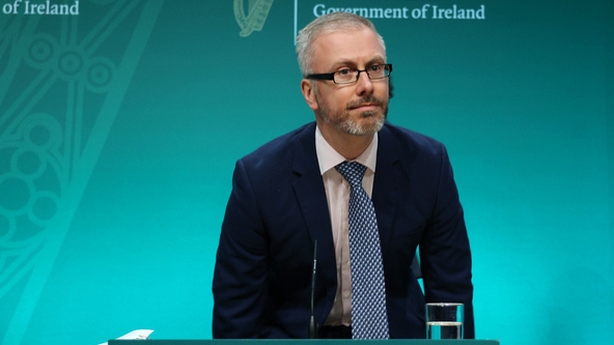Tented accommodation is once again being used to house international protection applicants in Knockalisheen in Co Clare, despite Minister Roderic O'Gorman's commitment last month that those tents would not be used again.
A spokesperson for the Department of Children, Equality, Disability, Integration and Youth confirmed to RTÉ News that "there are currently 88 people residing in tented accommodation".
The spokesperson said that the department "will endeavour to ensure that the use of tents at Knockalisheen is a short-term measure, but in the context of the accommodation shortage, the priority must remain on providing shelter".
"Nonetheless, the tented options previously in place in Athlone and Tralee will remain decommissioned and will not return to use," the spokesperson added.
Over 100 international protection applicants were moved out of the tents on the same site as the Knockalisheen Direct Provision Centre in Meelick in December after living there for three months.
It followed the relocation of around 165 people from tented facility in Athlone in Co Westmeath around the same time and the relocation of 40 international protection applicants from a tent in Tralee in Co Kerry in November.
On 7 December, a statement issued by the department to RTÉ News said that tented accommodation will "cease to operate once the current residents are all re-accommodated".

Five days later, on 12 December, Minister O'Gorman told RTÉ's Today with Claire Byrne: "We are not going to be using the tents in Knocakisheen again."
Concerns had been raised by NGOs and migrants' rights groups about people sleeping in the tents during the winter months, particularly as temperatures fell below zero in the first weeks of December.
At the time Fianna Fail TD from Meelick in Co Clare, Cathal Crowe described conditions in the tents as "inhumane".
Speaking to RTÉ News, Mr Crowe said that "the Government took the right decision" in December to move people from the tents to alternative "more suitable accommodation".
"I understood at the time that that was the end of it, that the tents would go and that we'd go back to (just) the modular accommodation that we had in Knockalisheen, I understood the tents to be a thing of the past."
Mr Crowe said he was disappointed to learn that 88 people had been moved into the tents.
"Very little has changed in my opinion since December, yes the temperature had risen by a few degrees, but still, tented accommodation and the conditions around it, I don't think are suitable," Mr Crowe said.
"I hope that this decision will again be revisited. It is not a standard of accommodation that I would want anyone living in in the winter months," Mr Crowe said.
The National Director of the Jesuit Refugee Service, Eugene Quinn said it was "very disappointing to see the tents reopened so shortly after they were closed and following commitments made by the Minister that they would not be reopened."
"It is the position of JRS that tents do not meet the 'basic needs' requirement as set out under the Reception Directive and that they fall below the minimum standards required for a person to live with dignity," Mr Quinn said.
CEO of Limerick based Migrant Rights' Group Doras, John Lannon, said the decision was "surprising" in light of the minister's assurances in December that the use of tented accommodation for refugees would be discontinued.
"Given the concerns highlighted by Doras and others last year, particularly during the cold weather in December, it is vital that this is a very temporary measure only," Mr Lannon said.
"Knockalisheen does not have the capacity to deal with the additional numbers, and this means that every international protection applicant living there is affected by the increased numbers. In particular, the impact on the physical and mental wellbeing of people in the tents is huge. Tents are not suitable accommodation at any time but in Winter they can become quite unbearable.
"When people were moved into the tents at Knockalisheen last September they were told it would only be for a few weeks, and yet they were still there when the temperatures hit minus five degrees in December. We hope we don't see a repeat of this, and that people are moved to more appropriate accommodation within a matter of days or failing that, weeks.
"They also need to be provided with regular information and not left in a state of limbo, not knowing what lies ahead for them, and anybody identified as being particularly vulnerable needs to be moved out immediately."
CEO of the Irish Refugee Council Nick Henderson said he was "very concerned by the reintroduction of tents".
"In our opinion and experience they do not meet people's basic needs," he said.
"We recognise the challenges the State is facing but believe that, with all the power and resources available, there are other realistic options which can be used."
Clare Immigrant Support Centre co-ordinator Orla Ní hÉilí said that it was "very disappointing that the tents weren't actually decommissioned".
Ms Ní hÉilí described moving international protection applicants into the tents again as "a serious matter".
She said they "thought that was the end of it" when people were moved in December.
"It isn't right, its demoralising" and she said she believed it was "going against the Reception Directive that we have signed up to around minimum standards".
Ms Ní hÉilí said they are aware of the pressures that exist in relation to accommodating both Ukrainian refugees and International Protection Applicants but that "the tents are not the answer".
A spokesperson for the Department said "the war in Ukraine combined with the high number of International Protection applicants continues to put real pressure on the Government’s ability to offer accommodation, and has resulted in the largest humanitarian effort in the State’s history."
According to figures provided by the department as of 2 January, it is providing accommodation to 51,955 Ukrainian refugees and 19,300 International Protection applicants.







